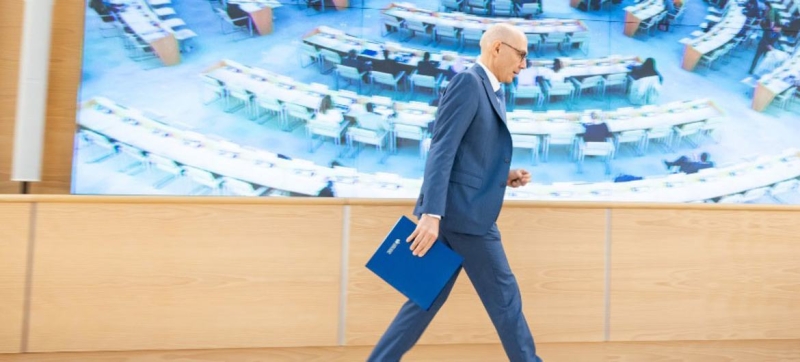
UN High Commissioner for Human Rights Volker Türk. Volker Türk: Damage to Ukraine’s energy infrastructure ahead of winter must stop Human Rights
November will mark 1,000 days since the Russian Federation’s full-scale invasion of Ukraine. The period was marked by massive destruction, death and displacement, as well as widespread violations of international law, UN High Commissioner for Human Rights Volker Türk said in Geneva as he presented his Office’s latest report.
The war has devastated people’s lives and their futures, leaving them with a legacy of trauma and loss, he stressed.
Rising casualty toll
“July 2024 was the most fatal month for civilians in Ukraine since October 2022. Between June and August, my Office confirmed a 45 per cent increase in civilian casualties compared with the previous three-month period,” the High Commissioner recalled.
“This increase is related to the large-scale coordinated attack by the Russian Federation on July 8 against targets across Ukraine, ongoing missile, drone and bomb strikes, as well as ongoing attacks by the Russian armed forces to seize Ukrainian territory,” he added.
Torture in places of detention
Violations of international human rights and humanitarian law continue in places of detention “hidden from the eyes of independent observers,” Türk said. The prohibition of torture under international law is absolute, he recalled.
“Nevertheless, my Office has received reports of widespread and systematic torture and ill-treatment of Ukrainian prisoners of war by Russian forces in detention facilities in many regions of the occupied territory and in the Russian Federation,” the High Commissioner said.
He reported that his Office had recently interviewed 174 Ukrainian prisoners of war. Almost all of them described torture and ill-treatment while in the custody of Russian forces, at all stages of their captivity.
“Minimum safeguards to help prevent torture, such as allowing prisoners to communicate with the outside world, access for independent observers or regular medical examinations, were absent or ineffective,” the High Commissioner noted. Turk.
The involvement of authorities and “dehumanizing rhetoric”
The data also suggests the involvement of facility managers and close coordination between different parts of the Russian Federation, such as the Federal Security Service and the Federal Penitentiary Service.
In several cases where officials visited internment facilities, torture and ill-treatment temporarily stopped and conditions improved, indicating that local authorities were aware of the practice, Türk said.
The “dehumanizing rhetoric” from Russian public figures continues, calling for inhumane treatment and even executions of Ukrainian prisoners of war, the High Commissioner added, with Russian military personnel benefiting from amnesty laws that fuel impunity.
“Torture and ill-treatment of Ukrainian prisoners of war must stop. Those responsible for this horrific practice must be held accountable,” Turk said.
Torture of Russian prisoners of war
Turk also reported that about half of the 205 Russian prisoners of war interviewed by his office since March 2023 reported torture or ill-treatment by Ukrainian authorities, with 10 of them reporting sexual violence. This typically occurred during the initial stages of captivity, when Russian prisoners of war were held in transit facilities for several days.
In almost all cases, torture and ill-treatment ceased after the prisoners arrived at official internment facilities, where conditions generally met international standards.
“I call on Ukraine to ensure that prisoners of war are treated in accordance with international law at all stages of their captivity. Access to places of internment has allowed my Office to engage directly with the Ukrainian authorities, which has contributed to the improvement of conditions,” Türk said.
Attacks on Ukraine’s energy infrastructure
Russian armed forces continued their systematic attacks on Ukraine’s critical energy infrastructure, mainly on electricity facilities, the High Commissioner said.
These attacks have significantly reduced Ukraine’s electricity generation capacity. The population already faced rolling blackouts in the summer. The situation risks worsening during the winter, when demand rises. Turk called this method of harming civilians “cruel”, especially in an urbanized country like Ukraine, with centralized electricity and heating systems.
“Electricity is nothing less than a blood supply. For hospitals that otherwise have to rely on backup generators. For heating and water in homes. For elevators that are crucial to getting elderly or disabled people to their homes. For cleaning groundwater to prevent the spread of infectious diseases,” the High Commissioner said.
He called on Russia to stop damaging civilian energy infrastructure.
Environmental damage
Concluding his speech, Türk drew attention to a less visible side of the conflict: environmental damage. According to him, the consequences of the military actions pollute the air, groundwater and soil, including that used for agriculture.
Intensive fighting near nuclear power plants and attacks on related infrastructure increase the risk of nuclear instability and accidents that could have serious transboundary consequences. Scientists warn that the conflict could completely change Ukraine’s ecosystems.
Türk called on the Russian authorities to grant his Office access to the territory occupied by the Russian Federation and to all areas of the Russian Federation affected by the conflict in order to document and monitor the human rights situation.
He also called on Russia to immediately cease military actions.
